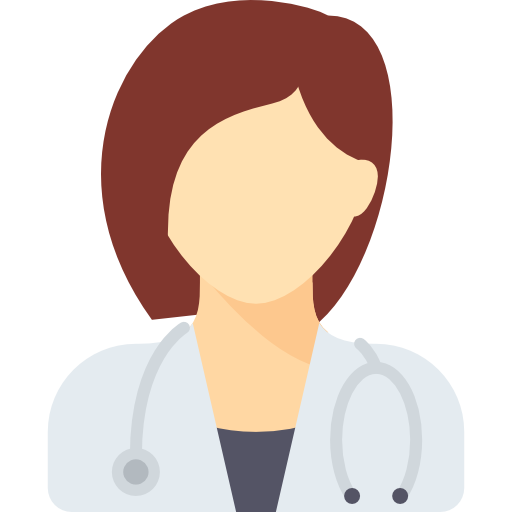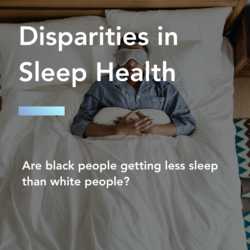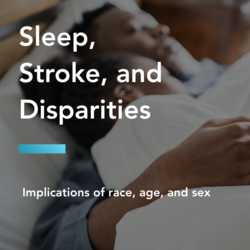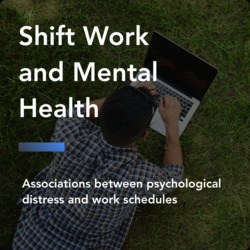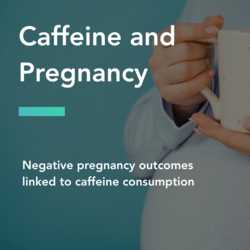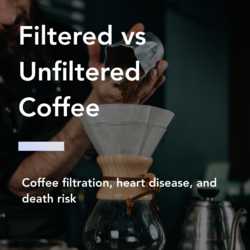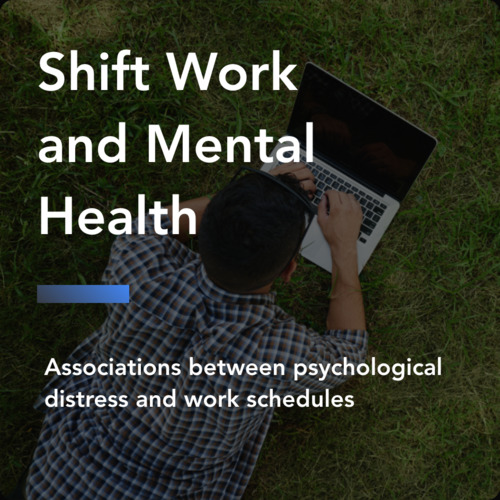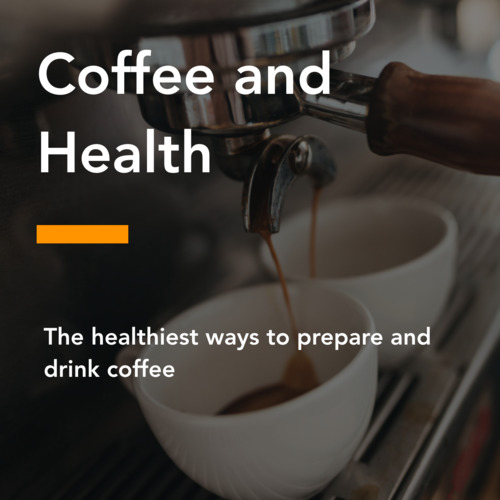Caloric Intake and Sleep Quality
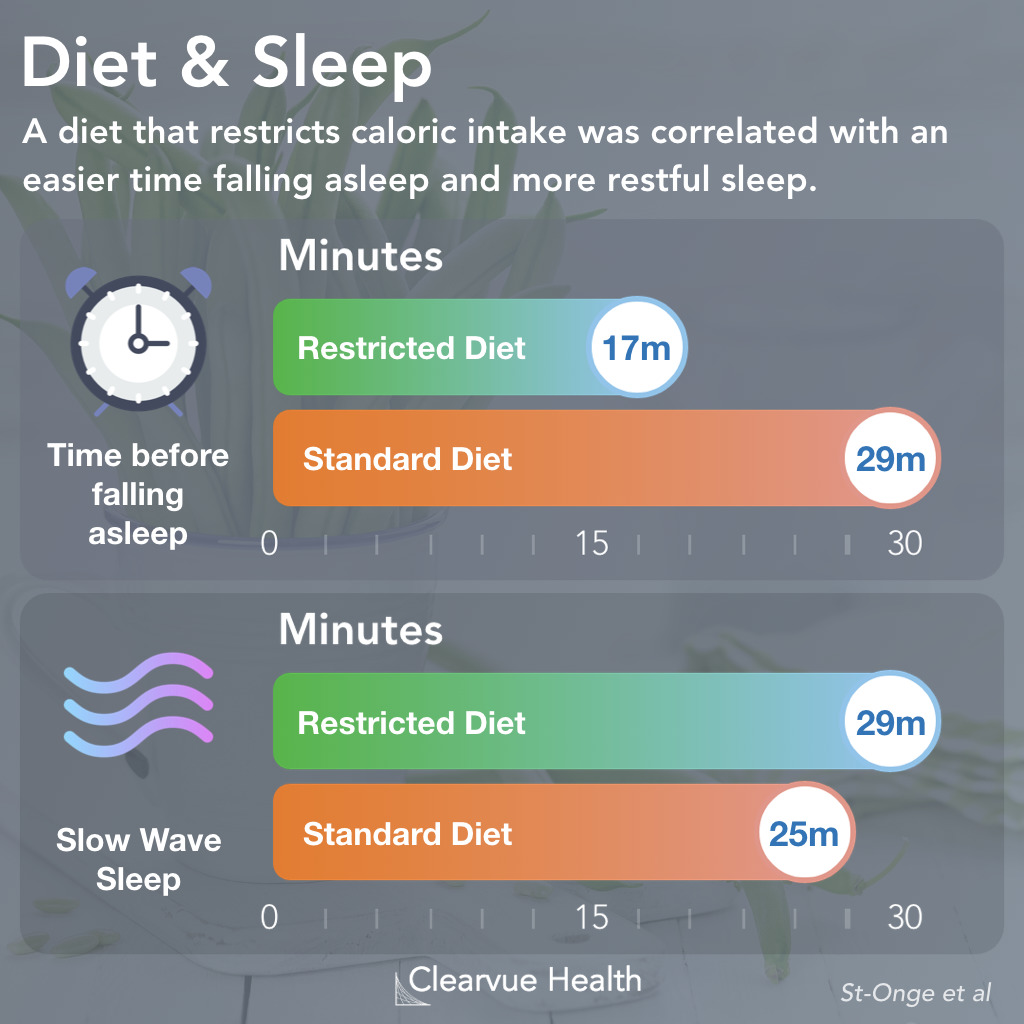
Figure 1: Calories and Sleep. Volunteers on a restricted diet with fewer calories took 17 minutes to get to sleep, compared to 29 minutes when they were on their normal diets. They also had an average of 29 minutes of slow wave sleep compared to 25 minutes on their normal diets.
Just by eating fewer calories, volunteers in a sleep study experienced significantly deeper sleep and faster sleep.
A new study conducted an experiment on 26 volunteers to see whether a controlled diet could change the quality of their sleep.
They didn’t use any special fad diets, medications, or shakes. Rather, they just had patients eat fewer calories of a balanced diet.
They found that when patients were on their restricted diets, it took them significantly less time to fall asleep compared to when they were on the regular diet.
Similarly, they had significantly more minutes of slow wave sleep with restricted diets than on a normal diet. Slow wave sleep encompasses the deeper phases of sleep that are responsible for most of your rest during sleep.
The main difference between the restricted diet and their normal diets was that they ate less with the restricted diet, suggesting that caloric intake may be the driving force behind these results.
Source: Fiber and Saturated Fat Are Associated with Sleep Arousals and Slow Wave Sleep
Slow Wave Sleep is also known as Deep Sleep. It encompasses stages 3 and 4 of sleep. It is believed to play an important role in how your brain recovers and restores itself overnight. It may also play an important role in solidifying your memories from the day. Scientists call it slow-wave sleep since your brain activity take sthe form of slow waves on an EEG. The next stage after slow-wave sleep is REM sleep.
Effects of Sugar & Saturated Fat on Sleep
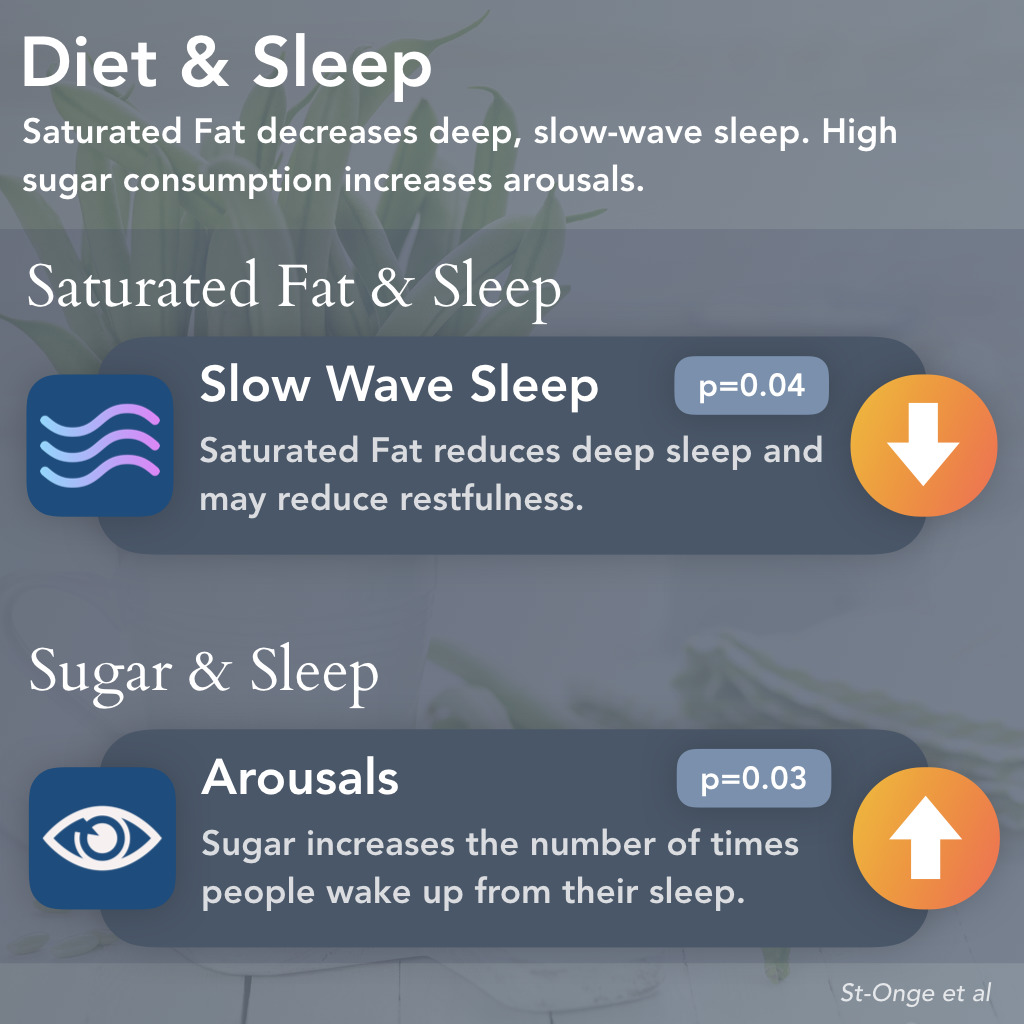
Figure 2: Effects of Sugar & Saturated Fat on Sleep. Saturated Fat reduces deep sleep and may reduce restfulness. Saturated fat intake was associated with significantly less slow-wave sleep (p=0.04). Sugar increases the number of times people wake up from their sleep. Sugar was associated with significantly more arousals (p=0.03).
The types of food that people eat also matters.
Individuals who ate a lot of saturated fats experienced significantly less slow wave sleep.
For a reason that is still unknown, saturated fat appears to get in the way of deep, restful sleep.
Sugars and carbs get in the way of staying asleep. As many people with insomnia may know, getting to sleep is just half the battle. Being able to stay asleep the whole night is another challenge of its own.
Eating lots of sugars and carbs is correlated with more arousals at night. People who eat a lot of sugar wake up more often in the middle of the night.
Fiber & Sleep Quality
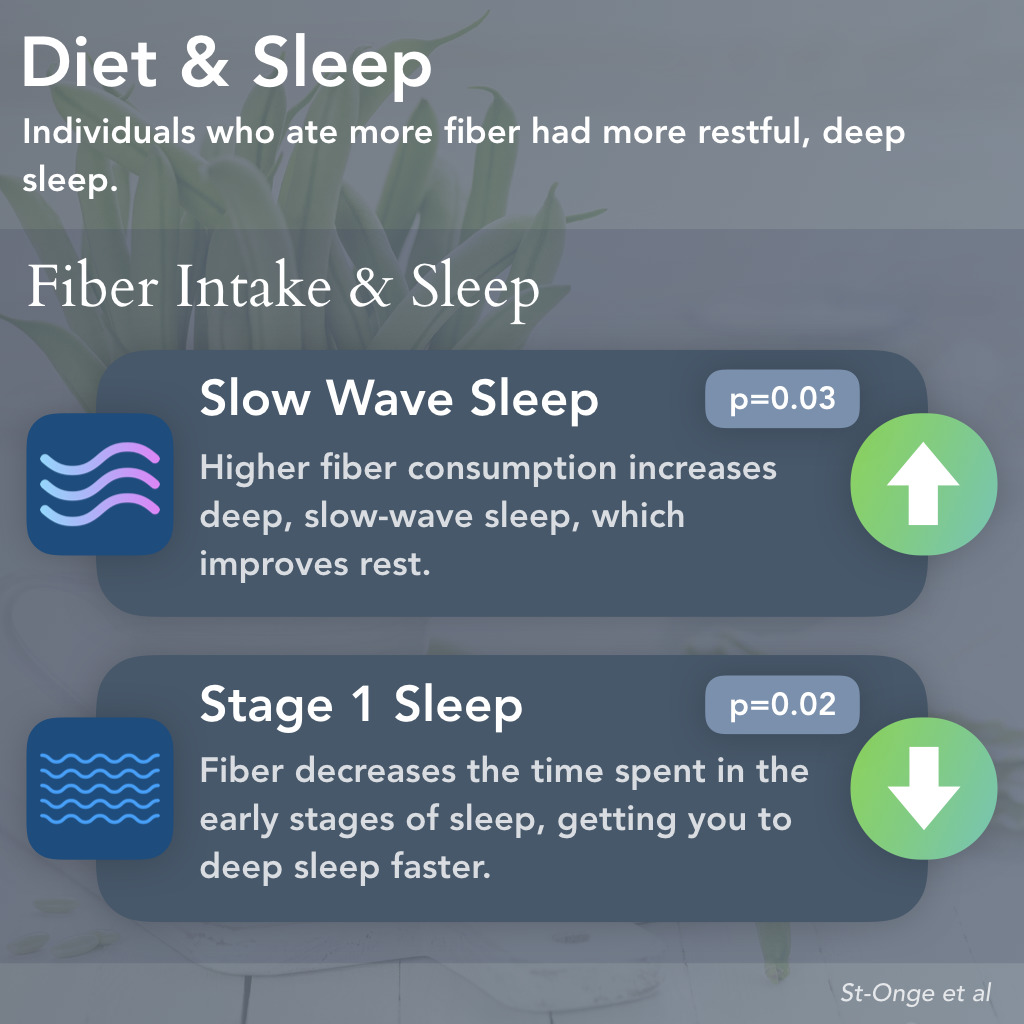
Figure 3: Fiber & Sleep Quality. Individuals who ate more fiber had more restful, deep sleep. Higher fiber consumption significantly increases deep, slow-wave sleep, which improves rest (p=0.03). Fiber significantly decreases the time spent in the early stages of sleep, getting you to deep sleep faster (p=0.02).
Fiber, on the other hand, is a superfood when it comes to sleep.
People who ate lots of fiber had more slow-wave sleep, indicating that they had a deeper, more restful sleep.
They also had less early-phase sleep. This suggests that even with the same amount of sleep, people who eat lots of fiber are able to achieve more rest. They are able to bring themselves into deep sleep faster and get more slow-wave sleep.
Top 5 Sources of Fiber
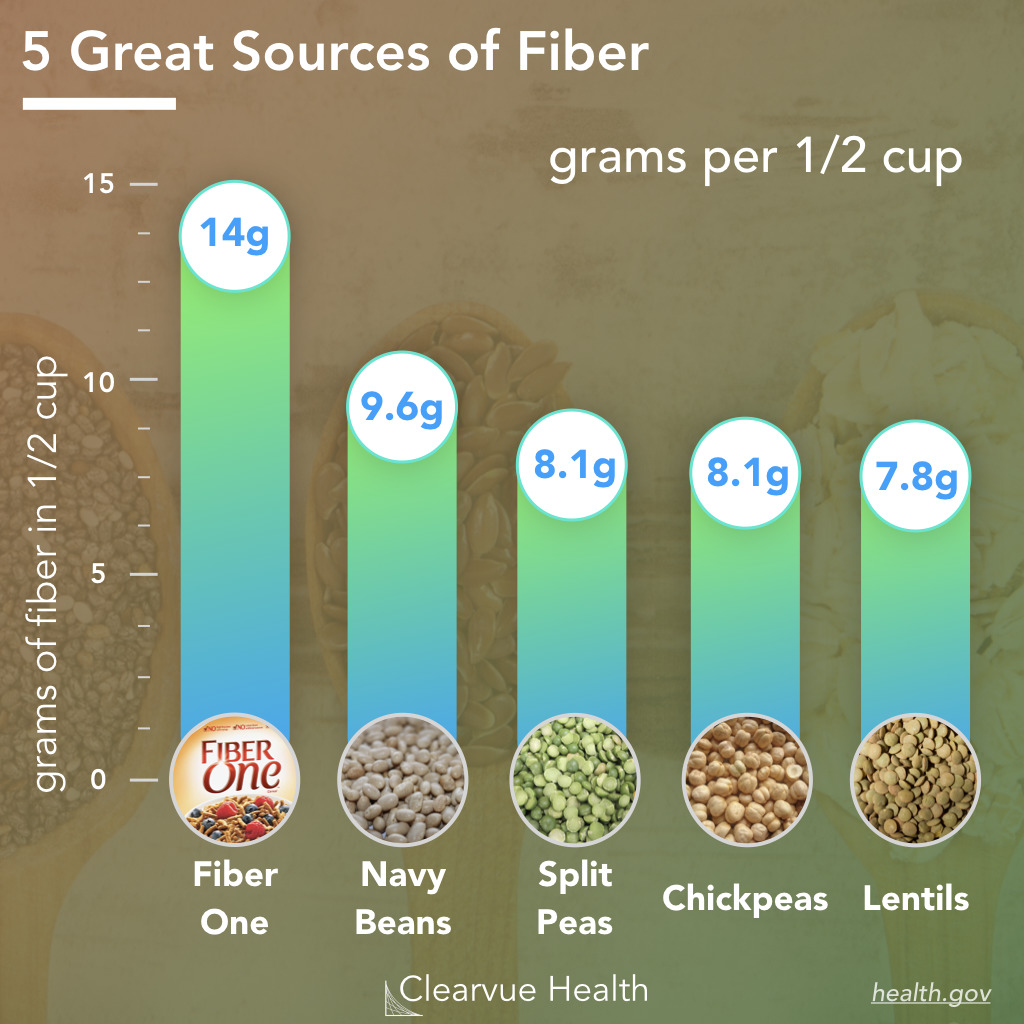
This research provides significant evidence that fiber may help sleep.
We've put together a graphic summarizing 5 great sources of fiber, according to health.gov. One of the best sources of fiber in terms of grams per 1/2 cup is high fiber cereals, such as Fiber One.
The best natural sources of fiber are typically beans and legumes. Lentils, chickpeas, and peas are all great ways increase your fiber intake naturally.
Keys to Health
Research is showing more and more that eating well doesn’t have to be hard. Eating more fiber, fewer carbs, and less saturated fat is going to be better for you in a whole multitude of ways.
+
Study Type - The study tested the same group of patients in two different conditions. This type of design is advantageous because any differences seen are likely the results of the intervention rather than differences between patients.
+
Endpoints - Researchers used appropriate endpoints for evaluating sleep quality.
-
Sample Size - Study size this study used a relatively small study size. While this was enough to detect some differences between patients, The margins of error were relatively large.
-
Bias Potential - This study did have significant potential for bias. Our dietary choices are not made in a vacuum. People who eat lots of fiber in their diet may have other health choices that can influence sleep. The study did not do an adequate job controlling for these other factors.
Hopkins Medicine
For better sleep: Eat complex carbohydrates such as whole-wheat toast or a bowl of oatmeal before bed. These foods will trigger the release of the sleepy hormone serotonin, and they don’t take long to digest.
NBC News
Too much sugar in your diet has a direct effect on blood sugar levels, which very directly influence your energy levels throughout the day. Sugar boosts energy levels quickly, but they crash quickly after that, too. Those energy surges and dips might lead you to reach for extra caffeine, sneak in poorly-timed naps or eat other foods you wouldn’t normally — all of which can affect sleep.
American Academy of Sleep Medicine
“The finding that diet can influence sleep has tremendous health implications, given the increasing recognition of the role of sleep in the development of chronic disorders such as hypertension, diabetes and cardiovascular disease,” said St-Onge.
Clearvue Health is not affiliated with above organizations. The information above is provided to highlight and link to useful further reading.




